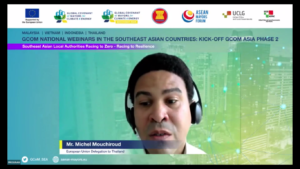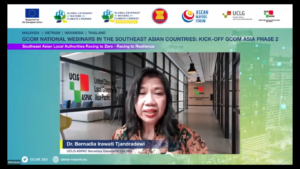In taking momentum of COP26, UCLG ASPAC as the Global Covenant of Mayors (GCoM) Secretariat for Southeast Asia and Lead Coordinator for the GCoM Global-Regional Coherence, held a Thailand national webinar with the theme “Collaborating Climate Action in Thailand for Implementation of GCoM Asia Phase 2” as part of ASEAN City Leaders Dialogue event that was held by UCLG ASPAC under the ASEAN Mayors Forum framework. This webinar discussed climate action taken by several cities and municipalities in Thailand as the pilot project of GCoM project in Southeast Asia.
Mr. Michel Mouchiroud, European Union Delegation to Thailand, opened the session by thanking all parties, especially cities and municipalities that have participated in succeeding the GCoM project in Thailand. The European Union has an ambitious target regarding net zero in 2050 and funding GCoM projects is one of the ways of aggregating efforts to make a difference. He hopes that more cities can join the global alliance to combat climate change through GCoM.
Dr. Bernadia Irawati Tjandradewi, Secretary-General of UCLG ASPAC and GCoM Southeast Asia Secretariat, said that COP26 is the important momentum to elevate multilevel cooperation and action in combating climate change. Local government is now considered as one of the prominent actors in the global climate agenda, all going towards the same direction to tackle climate change. More than 184 city governments in Asia have joined GCoM and more than 100 cities around the world are joining the global campaign of Race to Zero and Race to Resilience. Phase 2 of the GCoM Southeast Asia project started last year and will be ending in 2023. It is also fully funded by the EU.
Ms. Asih Budiati, Team Leader of GCoM Asia Project, said that cities have huge potential in emission reduction. With a proper climate action plan, GCoM city members can reduce a total of 76.5 gigaton of CO₂ emissions. GCoM Southeast Asia project is present to help cities and local governments in technical assistance in emission reduction. This assistance includes calculating emission generation, planning climate action plan, and implementation and monitoring of said CAP.
Assoc. Prof. Dr. Wichai Kanchanasuwan, Deputy Mayor of Hat Yai City, shared climate action measures that have and will be taken by the Hat Yai city government to develop a green and low carbon city. In the energy sector, Hat Yai city government has replaced 1,182 street light bulbs with more energy efficient LED bulb. The government has a target to replace all 4,556 street light bulbs to reduce 4,280 tons of CO₂ emission per year. In the transport sector, Hat Yai city government will be doing vehicle pollution measurement and planning to shift to electric public vehicles. The government is also currently working on monorail development to encourage people to shift to public transportation. In the waste sector, Hat Yai city government is planning to conduct a waste-to-energy plan which is expected to generate 6,5 MW electricity and reduce 6,392.84 ton CO₂ emission per year.
Dr. Vongvachira Ovararin, Deputy Mayor of Nakhon Si Thammarat City, shared that the city is currently focusing on the 3R (reduce, reuse, recycle) program along with other waste management efforts. Although Nakhon Si Thammarat City is still in the beginning phase of its climate action, he said that the city will take the opportunity to learn as much as possible from other cities through collaboration and partnership.
Mr. Anuk Pitukthanin, Chairperson of Foreign Affair of National Municipality League of Thailand (NMLT), said that in multilevel cooperation in climate action in Thailand, NMLT plays a role as bridge between local governments and various climate change related departments and institutions. Other than network development, NMLT also plays a role in raising awareness about climate change among municipalities and promoting best practices. In the future, NMLT will keep working closely with GCoM, members of NMLT, and UCLG ASPAC to promote and raise awareness of climate change issues.
Mr. Thawatchai Saengkhamsuk, Executive Director of Capacity Building and Outreach Office of Thailand Greenhouse Gas Management Organisation (TGO), said that his organisation is working with local governments in technical aspects in emission reduction. The assistance provided including capacity building activities, GHG inventory and report, developing and implementing climate action plan, and monitoring. The TGO will also be working with provincial level governments to widening the range of GHG emission reduction. Mr. Thawatchai also acknowledged that there are still many challenges for municipalities in executing climate action, primarily regarding the lack of data at the municipal level. Therefore, it is important for staff and practitioners to do capacity building in collecting data to record climate related data.
By KM Team













